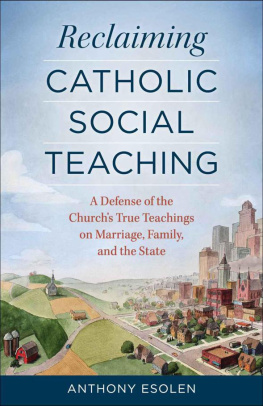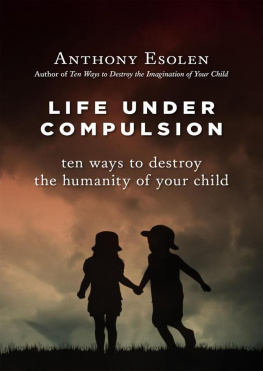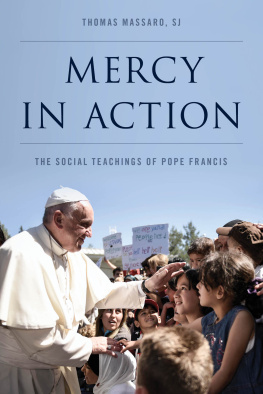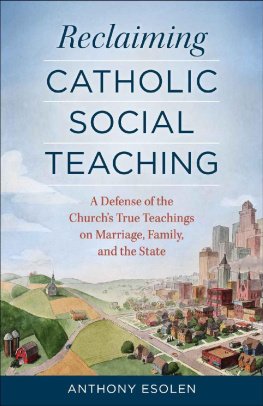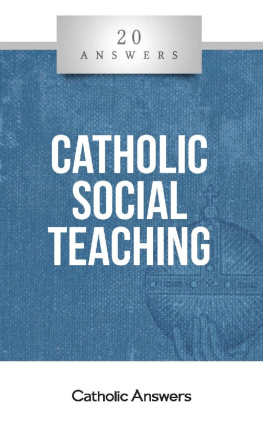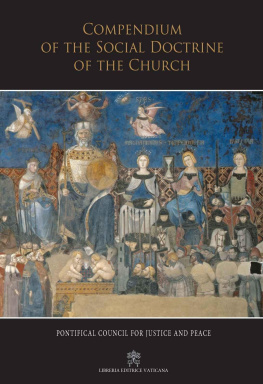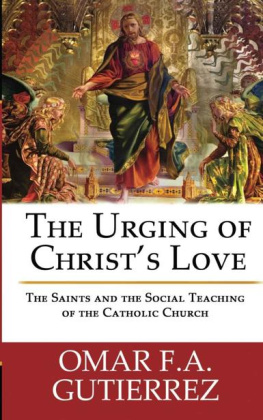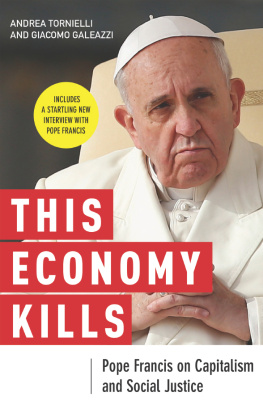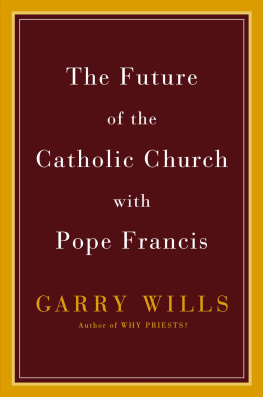Anthony Esolen
Reclaiming Catholic
Social Teaching
A Defense of the
Churchs True Teachings
on Marriage, Family,
and the State
SOPHIA INSTITUTE PRESS
Manchester, New Hampshire
Also by Anthony Esolen
from Sophia Institute Press:
Reflections on the Christian Life:
How Our Story Is Gods Story
Copyright 2014 Anthony Esolen
Printed in the United States of America
All rights reserved
Cover art by John Folley. Cover design by Perceptions Design Studio.
Scriptural quotations are taken from the King James Version of the Bible. No part of this book may be reproduced, stored in a retrieval system,
or transmitted in any form, or by any means, electronic, mechanical,
photocopying, or otherwise, without the prior written permission of the publisher, except by a reviewer, who may quote brief passages in a review.
Sophia Institute Press
Box 5284, Manchester, NH 03108
1-800-888-9344
www.SophiaInstitute.com
Sophia Institute Press is a registered trademark of Sophia Institute.
Library of Congress Cataloging-in-Publication Data Esolen, Anthony M. Reclaiming Catholic social teaching : a defense of the churchs true teachings on marriage, family, and the state / Anthony Esolen. pages cm Includes bibliographical references. ISBN 978-1-62282-182-2 (pbk. : alk. paper) ePub ISBN 978-1-622821-83-9 1. Christian sociology Catholic Church. 2. Leo XIII, Pope, 1810-1903. 3. Catholic Church Doctrines. I. Title. BX1753.E69 2014 261.8088'282 dc23 2014020772
This book is dedicated to my grandparents: John and Mary Esolen and Peter and Angeline Conserette. They came from Italy without any money, but with a will to work hard and to raise strong and virtuous children. They lived in material poverty, but they possessed the natural moral virtues of temperance, wisdom, justice, and the one without which the others are but words courage. They held the ramparts for their families against despair and the follies of the day. All that I owe to my parents I also owe to them; and may God let perpetual light shine upon them.
Contents
Abbreviations
Full bibliographical details and other works cited are listed at the end of the book. Numbers in the references throughout the text refer to the page numbers of the translation from which the quotation was taken.
AP Aeterni Patris
AD Arcanum divinae
AMC Au Milieu des consolations
AMS Au Milieu des solicitudes
AV Affari vos
CMS Cum multa sint
D Diuturnum
EIA Exeunte iam anno
GDC Graves de communi
HG Humanum genus
ID Immortale Dei
I Inscrutabili
LE Les Evenements
LP Libertas praestantissimum
LO Longinquae oceani
MC Mirae caritatis
ME Militantis Ecclesiae
PAA Pervenuti allanno
PD Providentissimus Deus
QAM Quod Apostolici muneris
RN Rerum novarum
SC Sapientiae Christianae
T Tametsi
TB Testem benevolentiae
Introduction
A Return to First Principles
It shall even be as when an hungry man dreameth, and, behold, he eateth, but he awaketh, and his soul is empty: or as when a thirsty man dreameth, and, behold, he drinketh; but he awaketh, and behold, he is faint, and his soul hath appetite: so shall the multitude of all the nations be, that fight against mount Zion. Isaiah 29:8 Wherefore do ye spend money for that which is not bread? And your labor for that which satisfieth not? Hearken diligently unto me, and eat ye that which is good, and let your soul delight itself in fatness. Isaiah 55:2
I s it possible, I have sometimes wondered, for a well-intended and intelligent person to get everything wrong, in the very matter upon which he sets his mind most energetically?
It is more than possible. If he begins from false principles, and if he is relentlessly logical, and if he looks askance at common sense, at traditions that are the distilled wisdom of many generations and at the evidence of human affairs around him, he not only may get everything wrong; he must get everything wrong.
If he were less logical, or more easily distracted from his ideas by the stubborn realities around him, he might blunder back into truth once in a while. But if he clings to the false principles, if they become to him a ruling deity, then he will be like Chestertons madman who has lost everything but his reason. Or he will be like a carpenter whose tools are out of kilter. His T-square is oblique, his straightedge is crooked, his level wobbles, his plumb line drifts. If he keeps on building with those tools, never stepping back to look at what he has actually wrought, he will not have built a bad house; he will not have built a house at all. He will have built a wreck, a monstrosity. The first strong wind will send it toppling.
Even if his tools are right, if he refuses to respect the nature of the materials he builds with, he will succeed only in building a great ruin. Maybe, in some world of his dreams, willow should be as strong as oak, marble should be as light as concrete, and sand should be as stable as rock. But we must build in this world that we live in. In this world, a carpenter of long experience can tell you how to work with beams that are never going to be exactly straight. In this world, a mason of long experience can tell you how to build with stones that are never quite identical in shape and size. In the world of somebodys logical dreams, a boy with half the strength of a man may cut down an oak tree in twice the time. In this world, the ax will break the boy and leave his hands covered with blisters before he gets anywhere near the heart of the tree.
As in carpentry and masonry, so in human affairs. We must have good tools, and we must respect the material we work with; that is, we must begin from correct principles, and we must be steeped in humanity. We must know what human beings are, what they are for or, to put it a different way, what perfection they should seek. We must also know their limitations, physical, emotional, and intellectual. And we must be honest about their moral weakness, what Christians call their fallen nature. Because any one persons experience is going to be quite limited, we must avail ourselves of the long experience of mankind that is summed up in that sad and glorious thing called history. Add to all of this that we the builders are also the objects of the building. We must be honest about ourselves.
The person who seeks out first principles, and who at the same time fixes his gaze upon human realities, is not likely to be fooled by phantasms. He is not likely to mistake a dream of bread for the real thing. Imagine someone appealing to Lord Baden-Powell, founder of the Boy Scouts, to justify the activities of gangs in Los Angeles. Baden-Powell wanted boys to do risky things, and whats more dangerous than running guns or smuggling cocaine or fighting another gang in a shooting spree? He enjoined upon the Scouts a stern code of honor and loyalty, and who is more loyal than a recruit for the Crips? Who is more willing to shed his blood for the honor of the gang?
The reply must be, You are mistaking a phantasm for a reality. That is because you have not gotten back to principles, and you are not really looking closely at human nature. It is not mere risk that we promote, but valor, staking all that you are for something truly noble, something that might well earn you the ridicule of the street crowd. We know that boys are attracted to danger. We do not seek to change that, even if we could. We want them instead to be attracted to something far more adventurous than a street brawl. We know that we can do this, because it has been done before, and that is something you seem to have forgotten.
Or imagine someone appealing to Michelangelo to justify pornography. Michelangelo painted nudes all over the Sistine Chapel. He endured the disgruntlement of the prudish, so that the figures in his Last Judgment were later provided with discreet veils and tunics and loincloths. He admired the sculpture of ancient Greece, and there are pieces of Greek pottery that would make even a high school health teacher blush. So why should a busy stockbroker in a hotel not relax in front of a television, watching whatever delights his sophisticated tastes?
Next page
